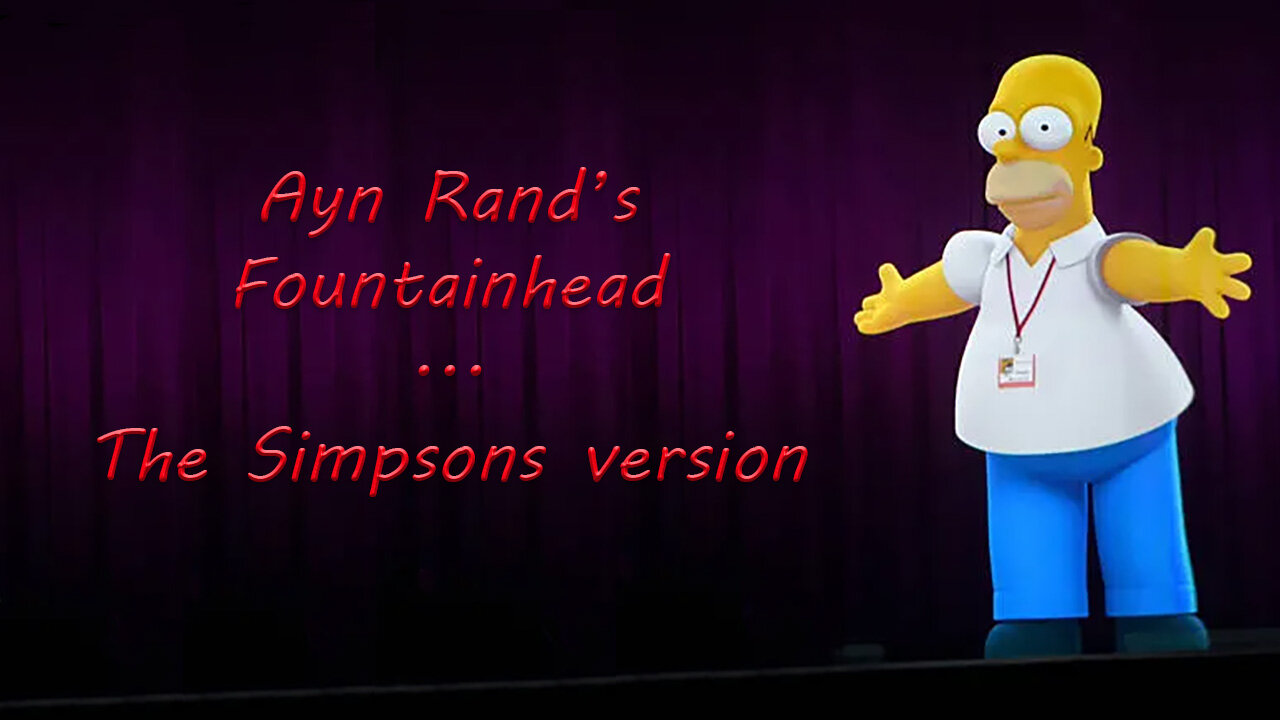Premium Only Content

'Fountainhead' (1999) The Simpsons Version
In the satirical world of The Simpsons, even the high seriousness of Ayn Rand’s 'The Fountainhead' is not immune to parody. In the episode “Four Great Women and a Manicure” (Season 20, Episode 20), the show delivers a segment titled “Maggie Roark,” a direct and clever spoof of Rand’s famous novel. Though brief and comedic, the sketch distills Rand’s core themes of individualism, nonconformity, and the struggle of the creative mind against the tyranny of mediocrity.
The segment reimagines Maggie Simpson, the family’s famously silent infant, as a stand-in for Howard Roark, Rand’s fiercely independent architect. In a preschool where conformity is strictly enforced, Maggie defies the system. While the other toddlers mindlessly stack blocks in identical patterns, Maggie constructs radical, creative structures. Her rebellion quickly attracts the ire of the school's authoritarian staff, who symbolize the collectivist forces Rand so often vilified.
As in 'The Fountainhead', Maggie is punished for her refusal to compromise. The turning point arrives when she literally destroys the institution that tried to contain her spirit — echoing Howard Roark’s dramatic destruction of his corrupted housing project. This is followed by a courtroom scene in which Maggie, voiced internally by Jodie Foster, delivers a monologue defending her right to think, create, and refuse to submit. The speech, though condensed, echoes the central ideological spine of Rand’s original work.
Despite being just a few minutes long, the parody is surprisingly faithful to Rand’s narrative arc. It captures the essence of Roark’s character and philosophy while recontextualizing it in absurd yet telling terms. The idea of a baby asserting Objectivist ideals through block architecture both lampoons and highlights the extremity of Rand’s worldview. It’s a rare instance where satire doesn’t entirely undermine its subject but instead pays it a kind of irreverent homage.
The segment functions as both critique and tribute. It pokes fun at the moral absolutism and self-serious tone of The Fountainhead, yet it also manages to communicate its key themes in a way that’s accessible to a wide audience. That The Simpsons could turn a mid-century philosophical novel into a visually amusing and conceptually coherent cartoon sketch is a testament to the show’s enduring intelligence.
In the end, “Maggie Roark” works not just as parody but as commentary. It reminds us of the cultural reach of Rand’s work and how her ideas continue to provoke — even when filtered through the unlikely figure of a pacifier-sucking toddler with a vision.
-
 LIVE
LIVE
Flyover Conservatives
7 hours agoIs AI Actually Alien Intelligence? Dr. Jason Dean Exposes the Dark Side | FOC Show
234 watching -
 1:47:36
1:47:36
Glenn Greenwald
4 hours agoJD Vance and Rand Paul Clash on Due Process: War on Terror Echoes; Has the U.S. Given Up on Confronting China? Ben Shapiro's Latest Falsehoods About Israel | SYSTEM UPDATE #510
71.3K44 -
 LIVE
LIVE
RaikenNight
1 hour agoExploring the Galaxy of No Mans Sky
29 watching -
 LIVE
LIVE
Spartan
3 hours agoRanked and Expedition 33 (NG+4 and all enemies Set to 10x health)
36 watching -
 LIVE
LIVE
Jokeuhl Gaming and Chat
6 hours agoDARKTIDE - Warhammer 40k w/ Nubes and AoA
54 watching -

Nerdrotic
13 hours ago $2.68 earnedNerdrotic Nooner 513
28.4K2 -

BigTallRedneck
2 hours agoRANKED FINALS W OMEGA
3.71K -
 LIVE
LIVE
Eternal_Spartan
10 hours ago🟢 Eternal Spartan Plays Final Fantasy 7 Rebirth Ep. 3 | USMC Vet | Join the Best Chat on Rumble
52 watching -
 LIVE
LIVE
megimu32
2 hours agoOTS: Ace Ventura & The Death of 90s Comedy
134 watching -
 LIVE
LIVE
We Like Shooting
15 hours ago $0.74 earnedDouble Tap 426 (Gun Podcast)
116 watching